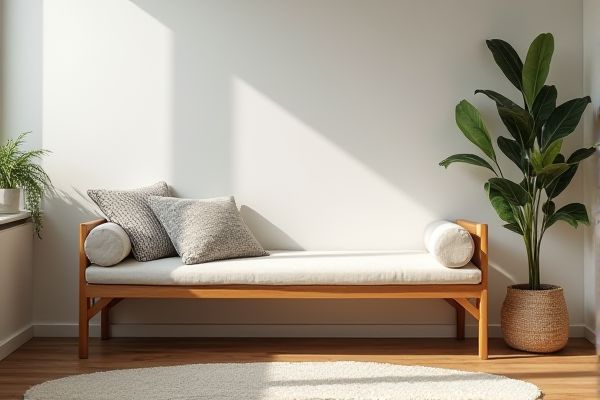
A cushioned bench provides superior comfort and softness, making it ideal for prolonged seating, while a wooden bench offers durability, a classic aesthetic, and ease of maintenance. Explore the rest of this article to discover which bench type best suits your needs and complements your space.
Table of Comparison
| Feature | Cushioned Bench | Wooden Bench |
|---|---|---|
| Comfort | High - Soft cushioning provides added comfort | Low to Moderate - Hard surface, less comfortable without cushions |
| Material | Wood or metal frame with foam padding and fabric or leather cover | Solid wood, typically oak, pine, or teak |
| Durability | Moderate - Cushion may wear out or degrade over time | High - Long-lasting and sturdy if well-maintained |
| Maintenance | Requires cleaning of fabric and periodic cushion replacement | Easy - Wipe clean, occasional refinishing or sealing needed |
| Weight | Generally heavier due to cushioning materials | Lighter, depending on wood type and thickness |
| Style | Modern and cozy, often with varied colors and patterns | Classic, rustic, or traditional aesthetic |
| Cost | Usually more expensive due to additional materials | Varies - Often less costly but depends on wood quality |
| Best Use | Indoor seating, living rooms, bedrooms | Indoor and outdoor seating, patios, gardens |
Introduction: Comparing Cushioned and Wooden Benches
Cushioned benches provide enhanced comfort with soft padding and upholstery, making them ideal for prolonged seating in living rooms or bedrooms. Wooden benches offer durability and a classic aesthetic, suitable for outdoor spaces and rustic interiors due to their sturdy construction and natural finish. Your choice depends on whether you prioritize comfort or a timeless, maintenance-friendly design.
Aesthetic Appeal: Design and Style Differences
Cushioned benches offer a soft, inviting look with upholstered fabrics and padded seating that complement cozy, modern, or traditional interiors, enhancing your room's comfort and elegance. Wooden benches showcase natural grain textures and craftsmanship, providing a timeless, rustic or minimalist aesthetic that adds warmth and character to any space. Both styles serve different design purposes, with cushioned benches prioritizing comfort and wooden benches highlighting natural beauty and structural artistry.
Comfort Level: Cushioning vs. Solid Wood
Cushioned benches provide superior comfort with soft padding that reduces pressure points, making them ideal for extended sitting sessions. Wooden benches, while sturdy and durable, offer a firmer seating surface that may lack the same level of comfort but excel in support and longevity. Choosing Your bench depends on whether you prioritize immediate comfort from cushioning or the solid, natural feel and maintenance ease of wood.
Durability and Longevity
Cushioned benches offer comfort but may require more maintenance due to fabric wear, staining, and potential cushion degradation over time. Wooden benches provide superior durability and longevity, often withstanding daily use and outdoor conditions when treated or made from hardwoods like teak or oak. Investing in a solid wood bench typically ensures a longer lifespan and less frequent replacement compared to cushioned alternatives.
Maintenance and Cleaning Requirements
Cushioned benches typically demand more maintenance due to fabric or leather upholstery that requires regular vacuuming, spot cleaning, and occasional professional cleaning to prevent stains and wear. Wooden benches, on the other hand, are easier to maintain with simple dusting and wiping using a damp cloth, along with periodic polishing or sealing to protect the wood surface. Choosing between them depends on your willingness to commit time to upkeep and the type of environment where the bench will be used.
Cost Comparison: Initial Investment and Long-Term Value
Cushioned benches generally require a higher initial investment due to materials like foam padding and upholstery, often ranging from $150 to $500 depending on quality and design. Wooden benches typically cost between $100 and $300, offering a more affordable upfront option with durable hardwoods such as oak or teak providing long-term value through resistance to wear. Over time, cushioned benches may incur additional costs for reupholstering and foam replacement, whereas wooden benches demand occasional refinishing or sealing to maintain their appearance and structural integrity.
Versatility: Indoor and Outdoor Uses
Cushioned benches offer enhanced comfort, making them ideal for indoor use in living rooms, bedrooms, or entryways, while some weather-resistant models extend their functionality to covered outdoor spaces. Wooden benches provide durability and natural resistance to outdoor elements, making them well-suited for patios, gardens, and other exterior areas. Your choice depends on whether you prioritize comfort and indoor versatility or ruggedness and outdoor reliability.
Customization Options and Personalization
Cushioned benches offer extensive customization options, including fabric choice, color, foam density, and tufting styles, allowing you to tailor comfort and aesthetics to your space. Wooden benches provide personalization through various wood types, finishes, stains, and carving designs, enabling customization of texture and visual appeal. Selecting between cushioned and wooden benches depends on your preference for comfort customization or natural material personalization.
Environmental Impact and Sustainability
Cushioned benches often incorporate synthetic materials that can contribute to environmental pollution and present challenges for recycling, whereas wooden benches are typically more sustainable due to their renewable natural resource base and biodegradability. The environmental impact of wooden benches is reduced when sourced from responsibly managed forests certified by organizations like FSC (Forest Stewardship Council). You can enhance sustainability by choosing wooden benches with non-toxic finishes and cushions made from organic or recycled materials.
Choosing the Right Bench for Your Space
A cushioned bench offers enhanced comfort and warmth, making it ideal for cozy indoor settings or spaces where prolonged seating is expected. Wooden benches provide durability and a classic aesthetic, suitable for both indoor and outdoor environments, especially where weather resistance and easy maintenance are priorities. Your choice depends on whether you value softness and style or sturdiness and practicality for your specific space needs.
 homyna.com
homyna.com